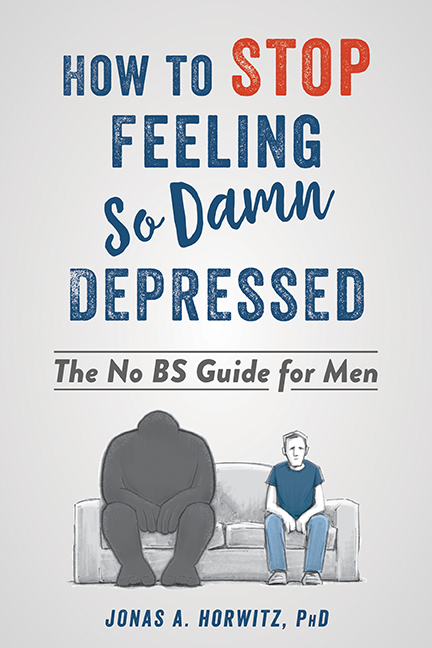By Jonas A. Horwitz, PhD, author of How to Stop Feeling So Damn Depressed
As a psychologist, I have found that working with men who are experiencing severe depression presents a series of unique challenges. Not only are they often in the midst of real crisis—such as going through an unwanted change in relationship status, job, or medical condition—but they are often in such horrible emotional pain, they are convinced they are helpless. They firmly believe there is nothing they can do to positively impact how they feel. This hopelessness will often manifest as a cynical, despairing voice they direct not only back at themselves, but also at the process of psychotherapy. In addition, as one of the primary symptoms of severe depression is impaired concentration, their ability to focus is often limited. Given the extraordinary stress they are under and the intense pain they are in, I don’t blame them.
A primary way I have found to be helpful is to encourage a severely depressed man to separate himself from his depression. That is, I strive to teach a man that these are actually two distinct things. On the one hand there is the man himself, which comprises his hopes, his dreams, the things he is good at, as well as the things he is lousy at, etc. On the other hand, there is this separate thing which is the bio/psycho/social syndrome of severe depression. The syndrome of severe depression includes all the DSM symptoms, such as significantly lowered mood, loss of interest, impaired sleep, chronic body aches, amotivation, difficulty concentrating, feelings of helplessness and hopelessness, as well as any suicidal ideation.
To help make this point clearer, I have in my office a large, stuffed gorilla-looking animal which I call The Beast. I will put this Beast directly next to the patient, point to him and say, “Here is you,” then pointing to The Beast, “here is your depression.”
I do this because I want to find a way for them to take action against their very syndrome of depression.
As I build my rapport with the patient, I will do my best to offer them support as they try to cope with their terrible situation. As the same time, I will try to get them to see that while they are truly going through hell, and this outward crisis has indeed made them horribly stressed, what has actually made them horribly depressed is the way their Beast has tricked them into dealing with their stress. That is, their Beast is getting them to do things that are making them feel much worse.
Like a Category-5 hurricane, a patient’s own severe depression needs “energy” to survive. Thus, it will try to get them to do a certain set of behaviors which always result in the patient feeling much more miserable. These are the very behaviors that “feed” their Beast. An example of this, for many men, is that their Beast will encourage them to get a drink. Not just one drink, but to go and get drunk. The alcohol molecule, which is classified as a depressant compound, always creates a rebound during the following twenty-four to seventy-two hours when their symptoms of depression become significantly worse. This is because flooding their brain with ethyl alcohol (ETOH) negatively impacts their brain’s production and synthesis of serotonin, as well as the other neurotransmitters which regulate their mood. During this period all their problems will seem worse and their feelings of hopelessness and helplessness will dramatically increase, which is exactly what their Beast of depression wants.
In my office I also have a mini-Beast. This is a smaller version of the big-Beast, which I hand to my patient and encourage them to put on their shoulder. This mini-Beast, I explain, is their depression, which may be toned down at times but is actually going through their life with them. This mini-Beast is watching everything they are doing. It is not only watching, but it is waiting for them to run into stress. Not just any kind of stress, but the kind of stress they believe they can’t handle. At that moment, their mini-Beast springs into action and begins whispering in their ear, trying to get them to engage in behaviors that will give The Beast significantly more energy.
I will explain to the patient that the only goal of the mini-Beast is to try and become the big-Beast. Typically, their mini-Beast says things like, “Man, you need a break. You need to blow off some steam.” It will try to get them to do things like getting drunk, stoned, gorging on sugary foods, or zoning out on electronic screens. Their mini-Beast is trying to get them to do these seemingly self-soothing behaviors because they will quickly become avoidance and numbing behaviors that always lead to a rebound in their depressive symptoms.
Identifying maladaptive coping strategies is, of course, just the beginning of the work. It is also essential to teach the patient about how his Beast of depression which has enveloped his mind is a depressive fog comprised of the classic cognitive distortions. These distortions include all-or-nothing thinking, catastrophizing, and over-generalization. I explain that his Beast is trying to get him to use these distorted thinking styles because it knows that the more he does, the more unsolvable his problems will appear, and the worse he will feel.
My focus in working with severely depressed men is to get them to think about what things they are currently doing to “feed” their own Beast. I then teach them small, direct, and specific strategies and behaviors that they can use every day to take energy away from their Beast. As many depressed men are caught in a cycle of hating themselves, redirecting their anger toward an outward manifestation of the depressive syndrome can often help them feel greater control and engender real feelings of hope. The key I have found is to highlight not only what “feeds” their Beast, but to get them to specifically identify what small behaviors they can do every day that take energy way from their Beast.
 Jonas A. Horwitz, PhD, received a doctorate in clinical psychology from Virginia Commonwealth University, where he conducted extensive research on adults who wrestle with chronic depressive disorders. He is a member of the American Psychological Association, the North Carolina Psychological Association, and the American Academy of Psychotherapists. He maintains a private practice in Durham, NC.
Jonas A. Horwitz, PhD, received a doctorate in clinical psychology from Virginia Commonwealth University, where he conducted extensive research on adults who wrestle with chronic depressive disorders. He is a member of the American Psychological Association, the North Carolina Psychological Association, and the American Academy of Psychotherapists. He maintains a private practice in Durham, NC.


 2024 Peace Playbook: 3 Tactics to Avoid Clashes with Your Partner
2024 Peace Playbook: 3 Tactics to Avoid Clashes with Your Partner